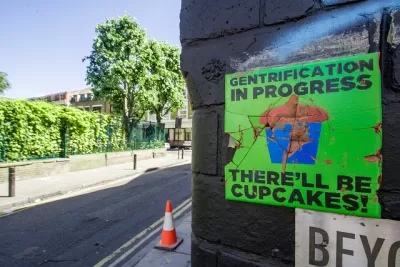“We could use some gentrification here.” Let's never say this—we must refrain from debating the long-term likelihood of gentrification in distressed places.

Does this sound familiar? A persistently poor, highly distressed, and long-screwed-over neighborhood is organizing around, lobbying for, or about to get some kind of reinvestment and someone raises the specter of gentrification. Those supporting the reinvestment get frustrated and say something along the lines of “Are you kidding? This place will never gentrify!” or “We could use some gentrification here.”
I think this particular exchange is one we should all commit to never having again.
Why You’re Both Right About Gentrification
Those who dismiss concerns of gentrification have some data behind them. Rapid housing cost appreciation and demographic turnover is a very real and growing problem, but it is still concentrated in a few high-cost markets, and a few select neighborhoods of other cities. Most poor census tracts have stayed stubbornly poor for decades, and more have slipped into poverty recently than climbed out of it.
Housing affordability and displacement are actually problems everywhere, but in most places it’s not due to gentrification. Many of the people who are frustrated when gentrification is brought up see the topic as part of a coastal/hot-market narrative that leaves their places out, and gives them policies that aren’t relevant for their realities—like hot-market centric inclusionary housing policies or funding models that don’t account for an appraisal gap. They worry that the very real, current needs of places being left behind are going to be sacrificed by fear of some unlikely future scenario.
Those who raise the concern also have a point, though. First, we should all remember that in the 1970s, the idea that New York City—especially the Bronx and much of Brooklyn—would gentrify was laughable. Or Hoboken and Jersey City.
FULL STORY: It Doesn’t Matter if Your Neighborhood Is Going to Eventually Gentrify

Trump Administration Could Effectively End Housing Voucher Program
Federal officials are eyeing major cuts to the Section 8 program that helps millions of low-income households pay rent.

Planetizen Federal Action Tracker
A weekly monitor of how Trump’s orders and actions are impacting planners and planning in America.

Canada vs. Kamala: Whose Liberal Housing Platform Comes Out on Top?
As Canada votes for a new Prime Minister, what can America learn from the leading liberal candidate of its neighbor to the north?

Washington State’s Parking Reform Law Could Unlock ‘Countless’ Acres for New Housing
A law that limits how much parking cities can require for residential amd commercial developments could lead to a construction boom.

Wildlife Rebounds After the Eaton Fire
Following the devastation of the Eaton Fire, the return of wildlife and the regrowth of native plants are offering powerful signs of resilience and renewal.

LA to Replace Inglewood Light Rail Project With Bus Shuttles
LA Metro says the change is in response to community engagement and that the new design will be ready before the 2028 Olympic Games.
Urban Design for Planners 1: Software Tools
This six-course series explores essential urban design concepts using open source software and equips planners with the tools they need to participate fully in the urban design process.
Planning for Universal Design
Learn the tools for implementing Universal Design in planning regulations.
Central Transportation Planning Staff/Boston Region MPO
Heyer Gruel & Associates PA
Institute for Housing and Urban Development Studies (IHS)
City of Grandview
Harvard GSD Executive Education
Regional Transportation Commission of Southern Nevada
Toledo-Lucas County Plan Commissions




























